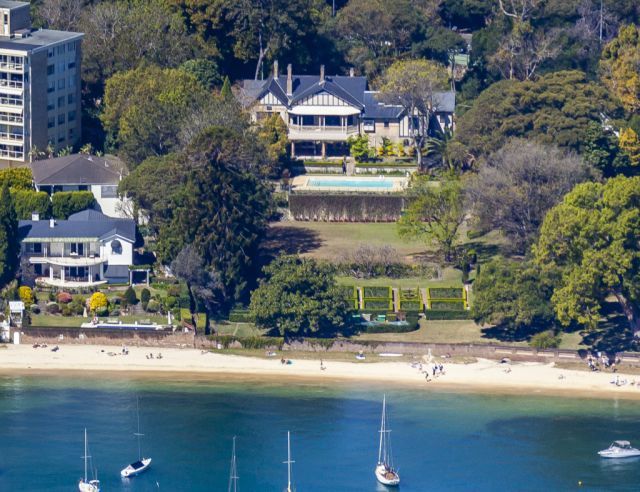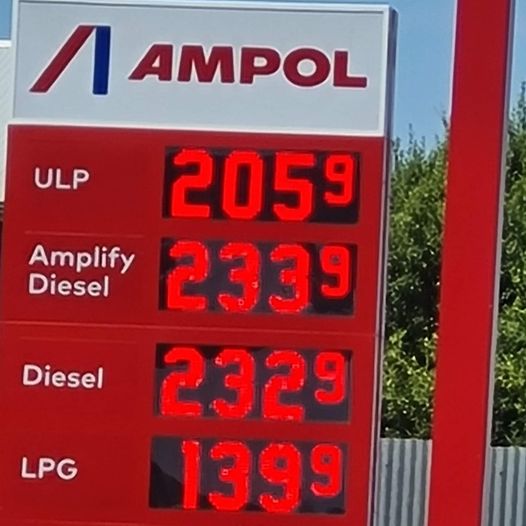Photo Above: Exorbitant petrol prices on 8 January 2023 in South Australia’s Kingscote. Surging fuel prices have driven up the costs of distributing food and other goods, helping to drive up all-round living costs.
Photo: Cheap Fuel Adelaide Facebook page
SICK OF PAYING HIGH FUEL, POWER & FOOD PRICES
FOR THE SAKE OF BILLIONAIRES’ FAT PROFITS?
CONFISCATE THE OIL, GAS, COAL &
POWER CORPORATIONS AND TRANSFER
THEM INTO PUBLIC OWNERSHIP!
30 December 2022: Everything is costing us more. Last year, one in six adults in Australia were unable to afford enough food to eat. Since then the inflation rate has surged to 7%. We are now paying 10% more for fruits and vegetables than we were just a year ago. Workers’ wages are nowhere near keeping up. Younger workers are especially doing it tough. Interest rate rises have hit those with mortgages left to pay off. And soaring rents mean that renters are suffering by far the most.
A major reason for rising prices is the surging cost of oil, gas and coal. This not only increases our transport and heating costs but has caused electricity prices to rise by one-fifth this year. This has in turn boosted the cost of both refrigeration and factory operation, which has pushed up the prices of both fresh and processed food. Meanwhile, the higher fuel costs for shipping, rail, truck, air and forklifts have driven up the distribution costs of food and other goods. The government and media blame all this on Russia. However, even before Russia’s intervention in Ukraine, inflation in all the capitalist countries was too high. This was because Western regimes had unleashed a flood of cheap credit and budget deficits to keep their flawed economies afloat following first, the late noughties recession and then, the pandemic. In Britain, inflation was more than 6% even before the war in Ukraine intensified. The war’s February 24 escalation did lead to a fuel price surge. However, this was not because of Russia but because of the economic sanctions that the regimes running the U.S., most of Europe and Australia imposed on Russia. Once again, our living standards are being sacrificed for the sake of the billionaire oligarchs that dominate Australia. In this case, they want to help the U.S.-led Western imperialist syndicate that they are part of to maintain its plundering domination of the world by ensuring that Russia – which is itself a capitalist country but independent of the Western bloc – cannot become powerful enough to challenge their stranglehold over markets and resources in Eastern Europe and western Asia. They want to shove Russia down to a humiliated condition.
Yet, even these sanctions have not, by themselves, caused the steep price rises. After all, Australia is a big energy exporter. Energy prices have only surged because the greedy bosses of Australian fuel resource giants have chosen to jack up prices to benefit from the higher world prices resulting from Western sanctions. The Albanese government has responded by putting a cap on wholesale gas and coal prices. However, these measures are so weak that the price limit for gas is nearly three times what the gas price was two and a half years ago! As a result, power prices are forecast to rise even more next year than they did this year! Furthermore, although the fuel sector bigwigs and their Liberal Party mates are completely cynical when they oppose even the half-baked price cap on the grounds that it will reduce fuel supply, it is nevertheless true that as long as profit-obsessed shareholders own this sector, they will manipulate markets to try and get their way.
The only way to ensure cheap and reliable fuel – and thus to also keep food and power costs down – is to rip the coal and gas companies from their super-rich owners and transfer them into public ownership. We must also address the petrol sector. Although the majority of Australia’s petrol is imported, the obscene prices charged for domestically produced LPG and oil – which amount to one-third of total domestic consumption – add to fuel prices. So does the cut taken by domestic refiners and retailers. Even though they have been hit by higher fuel costs, they have lifted their sales prices so much that they are grabbing even larger profits all at our expense! In this way, Australia’s biggest fuel distributor, Ampol, which also owns one of this country’s two refineries, more than doubled its already huge profits. Seizing on our expectations of higher fuel prices, Ampol’s refinery, alone, drastically lifted the mark up on their petrol price, in excess of all expenses, from less than two cents per litre in the first half of 2021 to 15 cents per litre a year later. The power sector, which state Liberal and ALP governments have largely privatised, is doing the same. Thus, even with rising fuel costs and even as it cruelly cut more than 500 jobs, Australia’s biggest electricity supplier, AGL, announced that it is expecting its underlying profit to rise this financial year. That is why we must fight to also nationalise the electricity generation and retail sectors as well as the oil extraction, refining and retail sectors. If the entire fuel and power sectors were brought into public hands it would also make it easier to enforce a rapid transition from fossil fuels to renewables and, most crucially, a transition without any job losses or wage cuts and with fully paid retraining of workers currently employed in fossil fuel industries. Most importantly, state ownership of these sectors could make it easier for Aboriginal rights activists to exert political pressure to block those projects that trample on Aboriginal community wishes, while ensuring that acceptable projects do not damage Aboriginal sacred sites and adequately transfer project revenues to local black communities.
A BIG BOUNTY FOR BILLIONAIRES
There is some overseas ownership of Australia’s fuel and power sectors. A major gas producer here is American giant, Chevron, in which the world’s sixth richest person, Warren Buffett, has a $A7.2 billion stake. Also, players in the local oil and gas industry are American behemoths Exxon-Mobil and ConocoPhillips and British giants, BP and Shell. However, it is locally-owned Woodside that is Australia’s largest oil and gas producer. The biggest fuel retailer, Ampol, is also Australian owned. The fact is that it is mostly local capitalists that are making obscene profits from this country’s energy resources and fleecing consumers and exploiting workers in the process! It is many of these same ultra-rich bigwigs that are also plundering the natural wealth of PNG and East Timor. Australia’s power sector is also mostly owned by local exploiters. Thus, the biggest generators and electricity (and gas) retailers here are Australian-owned AGL and Origin Energy.
Apologists for capitalism tell us that such companies are owned by middle-class “mums and dads” and super funds. However, the truth is that these types of investors account for only a small minority of the overall ownership of the corporations. Take this country’s biggest coal miner, Australian-owned BHP. The middle-class “mums and dads” that each have shareholdings of a value that’s less than $231,000 own just 10% of the company while the top 0.2% of shareholders own more than 80%. In most of these companies, the ultra-rich main shareholders use bank nominees as intermediaries to hide their identities. Nevertheless, one is able to identify some of the tycoons that dominate these industries. Take, for instance, Australia’s biggest onshore oil producer, Beach Energy. Its largest stake is held by Seven Holdings, a conglomerate owning Channel 7 TV, Boral and other firms that is owned by powerful Australian oligarch, Kerry Stokes. Meanwhile, the biggest individual shareholder in Australia’s largest thermal coal miner, Swiss-based Glencore, is its Australian former CEO, Ivan Glasenberg. Despite Glencore recently admitting that when Glasenberg was CEO its agents had paid millions to bribe officials in several African countries, Glasenberg’s wealth has skyrocketed by 65% to $12.5 billion over the last year due to Glencore jacking up its coal sale price. Portraying himself as different to Glasenberg and as a climate warrior is AGL’s controlling shareholder, Mike Cannon-Brookes. But at bottom, Australia’s third richest person is just your usual greedy tycoon, one known for buying up extravagant properties. AGL workers angry that they are being made to work harder and more dangerously due to the company’s job slashing and AGL customers livid at their ever-rising utility bills should know that Cannon-Brookes’ share of AGL’s 2022 profit that their labour and payments are contributing to is almost enough for him to buy another $100 million mansion like the Sydney one that he bought in 2018! Similarly, Kerry Stokes’ slice of Beach Energy’s 2022 profit, which he received part of through dividends and will get the rest whenever he sells his shares of the company’s profit-boosted equity, is more than three-quarters of what he needs to get himself another $110 million private jet! Think about that the next time you wonder why you are paying such steep prices when you fill up petrol or are angry why transport and food prices are so high!

Photo above: Mark Merton/Sydneyimages.com
Photo below: Dan Peled/AAP

BUILD A MASS WORKING CLASS-CENTRED CAMPAIGN
Especially given that the fuel and power industries are dominated by powerful tycoons, the ruling class will fervently resist any demands to bring these sectors into public ownership. Look at what happened in 2010 when the then Rudd Labor government attempted to introduce a much more modest measure – a tax on mining super profits. The mining magnates – led by Gina Rinehart and Andrew Forrest – responded by using their huge wealth to unleash a massive media advertising campaign against the tax, their mates in the Murdoch media denounced the tax and “sophisticated” critiques of the tax were churned out by the “independent” think tanks that these capitalists fund (like the right-wing Institute of Public Affairs that has received huge funding from Gina Rinehart and BHP). As a result, Rudd’s approval ratings plunged and his spooked Labor colleagues (showing typical Laborite cowardice) dumped him as prime minister. The Gillard government that followed immediately diluted the tax plan. Indeed, they watered it down so much that it barely collected any tax at all! When Rudd regained the prime ministership in 2013 he had learned his lesson… from a capitulating social-democratic point of view, that is. He did not try to bring back the originally proposed tax and, instead, put forward an agenda even more servile to the capitalist bigwigs than that of the ousted Gillard. That is why we need a new program to lead our workers movement: one that does not limit our demands to what is tolerable to the capitalists, as the ALP does, but instead fights to mobilise struggle against the capitalists to win what the masses actually need. That means building a campaign of mass actions – including union industrial action, rallies and blockades – to win the nationalisation of the fuel, resource and power industries.
Sadly, the global trend is currently towards privatisation. Pro-capitalist economists, academics and journalists have been able to sell us the lie that “public ownership doesn’t work.” However, their argument has a huge hole in it: the world’s most populous country, the Peoples Republic of China (PRC) runs on a system dominated by public ownership and has been delivering its workers the world’s fastest growing real wages. In the PRC, not only are its fuel and power sectors under the collective ownership of her people, so are most of her other key sectors. That is why while the capitalist world is today buffeted by runaway inflation, inflation is just 1.6% in China. Moreover, even if a PRC state-owned enterprise makes excess profits, the income goes back into the public budget to be used for anti-poverty, public housing and renewable energy projects. Although China’s transition to socialism is incomplete and somewhat deformed, the fact that her system is based on socialist public ownership is why capitalist regimes want to denigrate the PRC. For they know that such a system favours workers at the expense of their capitalist class and they fear that if their own masses see the PRC’s successes, they will want socialism too. It took a revolution by China’s toiling classes in 1949 to establish her public ownership-based system. Although militant struggle could force the regime here to nationalise the fuel and power sectors, to secure a system of common ownership of all key sectors will take our own socialist revolution. Demanding the confiscation of the fuel and power sectors advances the struggle for socialism by showing the need for collective ownership. In campaigning for this measure, we will be fighting for what we need right now to stop the rapid erosion of our living standards. So, let’s fight for the confiscation of the coal, oil, gas and power companies and their prompt transfer into public ownership! And let’s also oppose the sanctions on Russia – we don’t want to wear higher prices for the sake of the global ambitions of the capitalists that are ripping us off!
